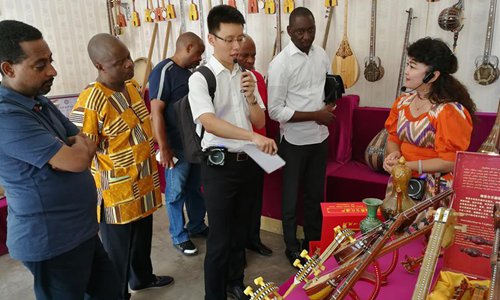HOME >> OPINION
Xinjiang visit exposes hollow Western media claims
By Fabio Massimo Parenti Source:Global Times Published: 2019/9/16 23:48:40

Members of the UN envoys delegation visit a village known for ethnic instrument making in Shufu county of Kashgar, Northwest China's Xinjiang Uyghur Autonomous Region on August 31. Photo:Xinhua
From September 3 to 7, I took part in a study visit to Northwest China's Xinjiang Uyghur Autonomous Region, where I had the opportunity to see the capital, Urumqi, and Kashgar, a multi-ethnic city located in the far west. Xinjiang is an autonomous Muslim region, bordering eight countries, with a unique archaeological and natural richness, where multiple Central Asian ethnic groups have been mixing for centuries. It is no coincidence that it has always been at the fundamental junction of the ancient and contemporary Silk Road.
The trip, along with Chinese and foreign scholars from Europe and Asia, was extremely instructive. We first visited the Xinjiang International Convention and Exhibition Center in Urumqi, which hosts an exhibition of the major terrorist attacks and violent crimes that took place in Xinjiang from 1990 to 2015. Original videos, photographs, descriptions, explosive devices and weapons used to carry out crimes are on display. It is a unique and shocking exhibition, which presents everything that was ignored by Western media.
After this first visit, we headed to the Xinjiang Islamic Institute, a college for Muslim students. This institute is largely funded by the central government, which guarantees a large part of the resources for its operation, as well as contributing to scholarships for families in need. Founded in 1983, the institute awards degrees and also offers non-academic training aimed at performing religious services. Students take courses in languages, religion, law, culture and history. In September 2017, the new campus, 5.7 times larger than the old one in the downtown of Urumqi, was built in the suburban part of the capital. In other words, this institute is just one example that shows how legal religious activities, carried out in compliance with national laws, are widely supported, promoted and protected by local governments in close collaboration with the central government.
We then went to Kashgar and visited the only vocational education and training center in the city, what is called "concentration camp" or "forced re-education camp" by Western media and non-independent NGOs. These labels have been used to discredit the Chinese government as a repressor of minorities. The fact is the vocational education and training centers in Xinjiang are real ones established to implement new, advanced and non-repressive counter-terrorism and de-radicalization measures. They are structures created to respond to the socioeconomic, and above all, cultural causes of the "three evils" - terrorism, separatism and religious extremism.
Following these new experiments, the Xinjiang government has achieved initial results: For almost three years, 32 months to be precise, no more terrorist attacks have occurred in Xinjiang.
Diplomats, scholars, experts and representatives of the United Nations have been able to appreciate this reality. We talked with trainees in the center, we visited classrooms where lessons were taking place, we observed the innumerable professional activities that are taught, including courses for future experts in the field of tourism, e-commerce, business, beautician, electro technician, weaving, etc. In short, it is an experimental measure to go beyond the necessary repression of illegal activities related to the terrorist phenomenon.
All the trainees there committed minor crimes, linked to illegal activities carried out by impromptu imams, dedicated to imparting subversive rules, pushing children to disobey the laws, leave school and damage governmental structures. As noted by the director of the Serbian Institute of Contemporary History, Predrag Markovic, "even in Serbia we should have taken these measures, instead we put the radicalized young in prison, worsening their existential conditions." Learning Putonghua, in addition to ethnic language, and a profession is the only way to guarantee opportunities and real integration.
Representatives from Pakistan, Afghanistan, Bangladesh, India and Europe, who had knowledge of jihadist terrorism, have greatly appreciated the Chinese experience of combating terrorism, which can also provide useful elements for other countries and regions, including Europe. All this, it has been pointed out, may not be enough, but these Chinese experiments to defeat terrorism, of which the whole world is affected, must be absolutely shared in order to improve international cooperation in this field. China is in the midst of an ongoing process of legal codification to better standardize measures and actions to eradicate terrorism, to protect communities and their rights, as well as the various ethnic-cultural milieus.
The journey was finally enriched by a pleasant visit to the ancient city of Kashgar and an evening at the central market, where we were entertained by dances representing the numerous ethnic groups that coexist in the region. Xinjiang, like all areas inhabited by ethnic minorities in China, receives funding and support from the central government to develop. There are policies issued in favor of the development of local languages and culture, as well as the protection of religious activities.
This experience ended up with a day dedicated to an international seminar on "counter-terrorism, de-radicalization and protection of human rights," sponsored by the China Society for Human Rights Studies and other Chinese co-organizers. Fifty reports, all of which are extremely interesting, were presented to share research results and experiences on counterterrorism activities in one's own country, by Chinese and representatives from other 17 nations. There have been many questions, exchanges of experience and information, between those who seem to be concretely at work to remove the collective obstacles to peaceful coexistence. China is doing its part, it would be important to talk about it honestly and respectfully.
The author is currently foreign associate professor at China Foreign Affairs University. In Italy, he teaches at the International Institute Lorenzo de' Medici, Florence. He is also member of CCERRI think tank, Zhengzhou, and EURISPES, Laboratorio BRICS, Rome. His latest book is Geofinance and Geopolitics, Egea. Follow him on twitter @fabiomassimos
Posted in: VIEWPOINT